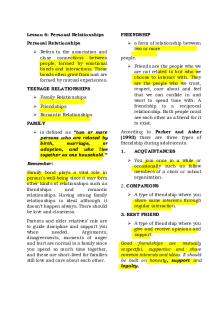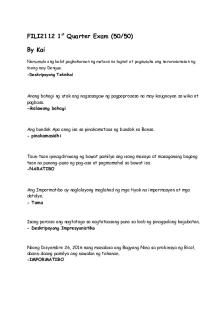Reviewer IN Perdev (1ST Quarter) PDF

| Title | Reviewer IN Perdev (1ST Quarter) |
|---|---|
| Author | Diane Alcaraz |
| Course | Science, Technology, Engineering, and Mathematics (STEM) |
| Institution | Lyceum of the Philippines University |
| Pages | 2 |
| File Size | 64.8 KB |
| File Type | |
| Total Downloads | 343 |
| Total Views | 562 |
Summary
Download Reviewer IN Perdev (1ST Quarter) PDF
Description
Reviewer in Personal Development for Quarterly Test
Hans Selye scientific work earned him a title “Father of Stress Research.” In the Alarm Phase you recognize the stressor, the nervous system is activated, your hormones act up, producing a surge of energy intended to allow you to handle the stressful situation. Your heart rate increases, your adrenal gland releases cortisol (a stress hormone), and you receive a boost of adrenaline, which increases energy. In the Resistance Phase you were able to restore his sense of balance once again. Your body is still in a state od arousal to resists any effects of stress in you In the Exhaustion Phase your body has depleted its energy resources by continually trying but failing to recover from the initial alarm reaction stage. The person may experience tiredness, depression, anxiety, and feeling an able to cope. Adolescence - is a transitional period in human development from puberty to adulthood. acceptance is recognizing the reality of what is and a lifelong process that you need to revisit every now and then. knowing yourself must be your top priority in life and knowing your purpose in life. It also means the development of understanding you as the human being on profound levels. personal development is defined as a process in which persons reflect upon themselves, understand who they are, accept what they discover about themselves, and learn (or unlearn) new sets of values, attitudes, behavior, and thinking skills to reach their fullest potential as human beings. personal strength is what you do best and where your genuine talents are and an advantage to get the most value for others. Benefits of keeping a journal A. capture ideas B. problem- solving C. self- improvement D. Better Health E. Reduce Stress F. Self Esteem G. Optimism core values are the beliefs that form how you think about yourself, others, and the world around you. Cerebellum regulates posture, balance, and muscular coordination Reticular activating system regulates attention, movement, sleep, waking, and reflexes Associative thinking is a mental technique that lets you explore an idea by considering all possible areas related to the topic at hand to get fresh insights. The functions of left brain A. Analytic thought B. Logic C. Language D. Reasoning E. Science and math F. Writing
Dominant function (left brain) A. Factual B. Logical C. Analytical D. Sequential E. controlled Functions of right brain A. Art awareness B. Creativity C.Imagination D.Intuition E. Insights F. Holistic thoughts G.Music awareness H.3-D form I. Left hand control Dominant function (right brain) A. Intuitive B. Holistic C. Spontaneous D. Open and flexible Mind-mapping is a creative way of exploring ideas through a graphic or presentation. James Marcia’s 4 identity stages are Identity diffusion, foreclosed, moratorium, Identity achievement
Sigmund Freud Psychosexual Theory A. Oral Stage ( 1st year of life) B. Anal Stage ( 2nd to 4th year) C. Phallic Stage (4th to 6th year) D. Latency Stage (7th year onwards) E. Genital Stage (12th year) Note: be familiar with Focus and trait outcomes Erik Erickson’s Psychosocial Theory A. Trust vs Mistrust ( birth to 1st year) B. Autonomy vs shame and doubt (2 to 3 years) C. Initiative vs. Guilt (3 to 5 years) D. Industry vs Inferiority (school age – 6 to 11 years) E. Identity vs Identity Diffusion (12 to 18 years Adolescence) F. Intimacy vs Isolation (19 to 40 years – Early Adult) G. Generativity vs Stagnation (40-65 years – Middle adulthood) H. Integrity vs Despair (65 years and up – Late Adult) Note: be familiar with issues, social condition and outcomes Jean Piaget Cognitive Development A. Sensorimotor Stage (birth to 2 years) B. Pre-operational stage ( from 2 to 7 years) C. Concrete operational (8-11 years) D. Formal operational (11 to 15 years) Note: be familiar with the descriptions Lawrence Kolhberg Moral Development A. Pre Conventional Level a. Punishment/obedient orientation
G. Number skills H. Right hand control B. Conventional Level
b. Reward orientation a. Social Approval (good boy/girl)...
Similar Free PDFs

Reviewer IN Perdev (1ST Quarter)
- 2 Pages

Reviewer IN Perdev (2ND Quarter)
- 2 Pages

4th Quarter Reviewer in Perdev
- 17 Pages

1st Quarter 1st Quarter
- 9 Pages

Perdev PRE Quarterly Reviewer
- 1 Pages

CPAR2122 1ST Quarter Exam
- 7 Pages

FABM-1ST- Quarter- Edited-converted
- 49 Pages

Grade 7 Science Module 1st 2nd Quarter
- 138 Pages

Perdev - Copy of a book
- 174 Pages

Book in Ethics (1st Year)
- 45 Pages

reviewer-in-civil-procedure-
- 60 Pages
Popular Institutions
- Tinajero National High School - Annex
- Politeknik Caltex Riau
- Yokohama City University
- SGT University
- University of Al-Qadisiyah
- Divine Word College of Vigan
- Techniek College Rotterdam
- Universidade de Santiago
- Universiti Teknologi MARA Cawangan Johor Kampus Pasir Gudang
- Poltekkes Kemenkes Yogyakarta
- Baguio City National High School
- Colegio san marcos
- preparatoria uno
- Centro de Bachillerato Tecnológico Industrial y de Servicios No. 107
- Dalian Maritime University
- Quang Trung Secondary School
- Colegio Tecnológico en Informática
- Corporación Regional de Educación Superior
- Grupo CEDVA
- Dar Al Uloom University
- Centro de Estudios Preuniversitarios de la Universidad Nacional de Ingeniería
- 上智大学
- Aakash International School, Nuna Majara
- San Felipe Neri Catholic School
- Kang Chiao International School - New Taipei City
- Misamis Occidental National High School
- Institución Educativa Escuela Normal Juan Ladrilleros
- Kolehiyo ng Pantukan
- Batanes State College
- Instituto Continental
- Sekolah Menengah Kejuruan Kesehatan Kaltara (Tarakan)
- Colegio de La Inmaculada Concepcion - Cebu




